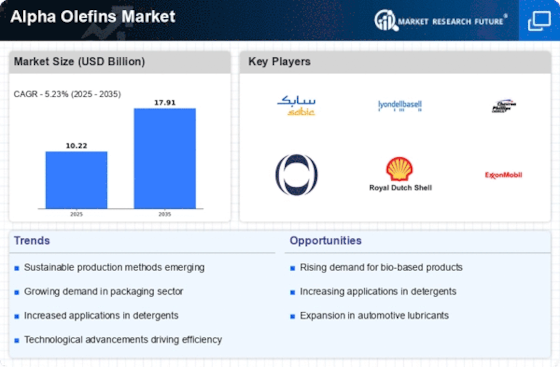Top Industry Leaders in the Alpha Olefins Market
 Alpha olefins are a versatile class of hydrocarbons with linear carbon chains and terminal double bonds. Their unique properties make them critical ingredients in various industries, including lubricants, detergents, plastics, and construction materials.This promising growth trajectory attracts intense competition among leading players, fueling strategic innovations and shaping the market landscape.
Alpha olefins are a versatile class of hydrocarbons with linear carbon chains and terminal double bonds. Their unique properties make them critical ingredients in various industries, including lubricants, detergents, plastics, and construction materials.This promising growth trajectory attracts intense competition among leading players, fueling strategic innovations and shaping the market landscape.
List of Strategies Adopted:
-
Product Diversification: Major players like Chevron Phillips Chemical and INEOS are expanding their product offerings to cater to specific application needs. This includes developing alpha olefins with different chain lengths and branching patterns, offering customized solutions for high-performance materials and specialty chemicals. -
Technological Advancements: Continuous R&D efforts focus on optimizing production processes, reducing energy consumption, and adopting environmentally friendly technologies. Shell, for instance, is using its proprietary AlphaButol technology to produce alpha olefins from renewable feedstocks like ethanol, a move towards sustainable production. -
Geographical Expansion: Asia Pacific, with its booming construction and automotive sectors, presents a lucrative market. Leading players like ExxonMobil and Dow Chemical are establishing new production facilities and strengthening partnerships in this region. -
Vertical Integration: Companies like SABIC and Sasol are vertically integrating their operations, controlling supply chains from feedstock acquisition to downstream applications. This ensures stable raw material supplies, cost optimization, and greater control over product quality. -
M&A Activity: Mergers and acquisitions are also playing a role in market consolidation. Dow Chemical's recent acquisition of Olin Corporation strengthens its position in the alpha olefins market and expands its reach in North America.
Factors for Market Share:
-
Production Capacity and Geographic Presence: Established players with large production capacities and a global footprint have a significant market share advantage. Companies like Shell and Chevron Phillips Chemical dominate the market with a diverse portfolio and extensive production facilities. -
Feedstock Sourcing and Cost Efficiency: Access to affordable and stable feedstocks like crude oil and natural gas is crucial for cost competitiveness. Companies like SABIC and Qatar Chemical Company, strategically located near feedstock reserves, benefit from lower production costs. -
Technological Expertise and Product Innovation: Leading players with advanced technological capabilities and a consistent focus on product innovation can offer high-performance alpha olefins and cater to specialized market niches. Evonik Industries, for example, excels in producing specialty linear alpha olefins for high-end applications. -
Brand Reputation and Customer Relationships: Established brands with strong reputations and long-standing customer relationships enjoy greater market loyalty and repeat business. Royal Dutch Shell's extensive track record and global sales network contribute to its significant market share.
Key Players
-
Chevron Phillips Chemical Company (U.S.)
-
SABIC (Saudi Arabia)
-
Qatar Chemical Company Ltd. (Qatar)
-
Royal Dutch Shell (the Netherlands)
-
Evonik Industries AG (Germany)
-
Sasol Limited (South Africa)
-
Ineos Group Limited (U.K.)
-
The Dow Chemical Company (U.S.)
-
Idemitsu Kosan Co. Ltd. (Japan)
Recent Developments :
-
September 2023: INEOS partners with Plastic Energy to develop a chemical recycling plant in Spain, aiming to produce circular alpha olefins from post-consumer plastic waste. -
October 2023: ExxonMobil invests in a joint venture with Braskem in Brazil to build a new alpha olefins production facility, catering to the growing South American market. -
November 2023: Evonik Industries successfully scales up its bio-based alpha olefins production using renewable feedstocks, marking a significant step towards sustainable alpha olefins production. -
December 2023: Shell and SABIC announce a collaboration on developing a new catalyst technology for alpha olefins production, aiming to improve efficiency and reduce emissions.










